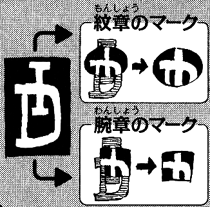- The symbol of Impel Down is an overlap of the prison name’s initials, “I” and “D”

- Various influences of “Hell” are present within its walls:
- Impel Down seems to be heavily based on how Hell is described in Dante Alighieri’s Divine Comedy. Both are level-based, “inescapable” prisons with unique forms of punishment per level, and the lower one traverses, the worse the punishments become.
- Level 3: Starvation Hell is ironically the third floor, while in Dante Alighieri’s hell, its the place where who was damned by the sin of gluttony are punished by “starving to death” inside Cerberus’s gullets.
- Level 4: Blazing Hell is a typical representation of Hell in cultural and fictional references, with intense flames and heat burning the “sinners” (or in this case, prisoners), while a demonic figure (in this case, the Jailer Beast Minozebra) pushing sinners into the flames. Magellan’s residence on this level could refer to this depiction of hell being where the devil resides. This resembles, in Dante’s tale, the level where violent people are punished: a lake of boiling blood, where the damned are drowning.
- Level 5: Freezing Hell is another thing that is based on Divine Comedy. In fact, this level is the one where the damned are fraudulent. With the only difference that the Dante’s damned are totally frozen into a lake of ice.
- A few of the levels of Impel Down also seem to resemble Buddhist concepts of hell such as the Crimson Hell which seems based on the “Hell of the Sword Tree and Knife Hill” which similarly tortures its victims by forcing them to run upon or impaling them upon trees and hills covered with knives and swords. Also the Four Jailer Beasts seem to resemble the Jailer Beasts Horse Face and Ox Head.
- Each of the high ranking staff members seems to have a devil theme in their dress codes, a reflection to how each level of Impel Down is called Hell.
- Level 5.5 is a pun, as it is pronounced Go Ten Go. “Goten” means “Roaring Heaven”, and Level 5.5 was portrayed as heavenly.
- The level 6 purpose of erasing a person from history is similar to the damnatio memoriae, a form of punishment in the ancient Rome which had the intent of erasing the memories a person and everything that could carry it to the future generation, effectively erasing the existence of a person from history.
 ONE PIECE GOLD
ONE PIECE GOLD







